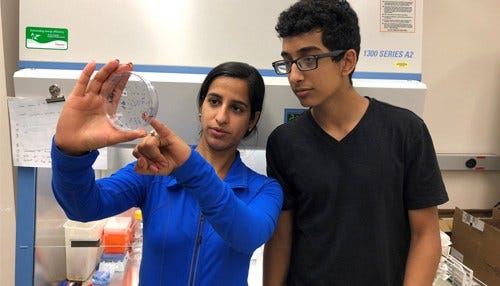Project SEED Inspires Disadvantaged Science Students
 "He’s smarter than I was
"He’s smarter than I was
Subscriber Benefit
As a subscriber you can listen to articles at work, in the car, or while you work out. Subscribe NowPhysician scientist Dr. Richa Sharma, who just finished her residency at Riley Hospital for Children, says a summer internship saved her life. Like the 35 Hoosier high school students who are currently part of Indianapolis Project SEED (Summer Experience for the Economically Disadvantaged), the deck was stacked against her as a teenager. A self-described “terrible” student on the verge of expulsion at Warren Central High School, she was a victim of circumstance—until Project SEED altered the course of her life and future career. And that goal remains the same this summer: to open the world of science to students who believe it’s beyond their reach.
Sharma spent her childhood in a small village in India that had no running water. Her family immigrated to Indianapolis when she was 11, and the adjustment was difficult. She spoke no English and lived in “not the best of neighborhoods” with her recently-divorced single mother, who worked multiple jobs to support three children. Sharma teetered on expulsion after being suspended twice during her freshman year with “terrible grades.”
“I just wasn’t trying, because I had bigger things and stupid teenager things to worry about, rather than trying to do well in science,” says Sharma.
Then she heard about Indianapolis Project SEED, a summer internship program that places disadvantaged high school students in academic and professional research labs as they earn a $2,500 stipend. But she needed at least a ‘B’ in science to qualify for the program, so she enlisted help from her chemistry teacher, who “realized the potential in me” and channeled Sharma’s newfound motivation to improve her grades. Although Sharma says she was interested in [Project SEED] for “the wrong reasons”—she needed the money and relief from her tough home environment—the summer experience helped her discover that she loves science.
“Coming from that background where your parents don’t really expect you to go to college, to [Project SEED] where that’s the trajectory—that saved my life,” says Sharma. “I have to give full credit to this program; I wouldn’t be here if it wasn’t for [Project SEED].”
Indianapolis Project SEED Program Coordinator Elmer Sanders says, “the track record of [Project SEED] being a transformative experience speaks for itself,” as the ranks of alumni are crowded with medical doctors, science and health executives, PhDs and many other successful professionals. The American Chemical Society established the nationwide program in 1968, and Indianapolis Project SEED is a standout: it’s the largest and longest-running program in the U.S.
The 100 applicants were whittled down to 35 high school students who are now spending the summer conducting research in labs, mostly at Indiana University-Purdue University Indianapolis (IUPUI) and Indianapolis-based Eli Lilly and Company.
“It’s unlike anything they’ve learned at their school,” says Sanders, “and unleashes the power of individual attention. They’re going from one teacher in a classroom of 25 kids to being the only kid in the lab, surrounded by five people, ranging from the principal investigator to post-docs, PhD students and undergrads. The student now has five instructors; that’s a lot of individual attention. They don’t have this anywhere else.”
Sanders says the program is designed to give hard-working students with good grades and strong teacher recommendations a hand up, boosting their self-esteem and paving a path to college.
“Authentic, legitimate, genuine achievement provides a level of confidence unlike anything else; the stories [from alumni] repeat themselves,” says Sanders. “We’ve had students publish scientific peer-review journal articles with their mentors within six months of their internship. This kind of achievement gives them a level of confidence that nothing else has.”
Sharma’s Project SEED experience has now come full-circle. As an undergrad at IU Bloomington, she volunteered at a shelter for women who have been abused. It sparked a lifelong friendship with a mother and her two young sons; the eldest, named Mohamed, is now in high school and living with Sharma’s family as he completes a Project SEED internship this summer.
“He likes science, and he’s smarter than I was,” laughs Sharma. “I have to give full credit to [Project SEED]. I wouldn’t be here if it wasn’t for this program.”
And by association, neither would Mohamed, who is on the path to becoming another successful Project SEED alumni.
Sharma says resiliency was one of the most important lessons her Project SEED mentor scientist taught her.
Sanders says Project SEED needs more funding to expand the program’s reach and the number of students involved.
